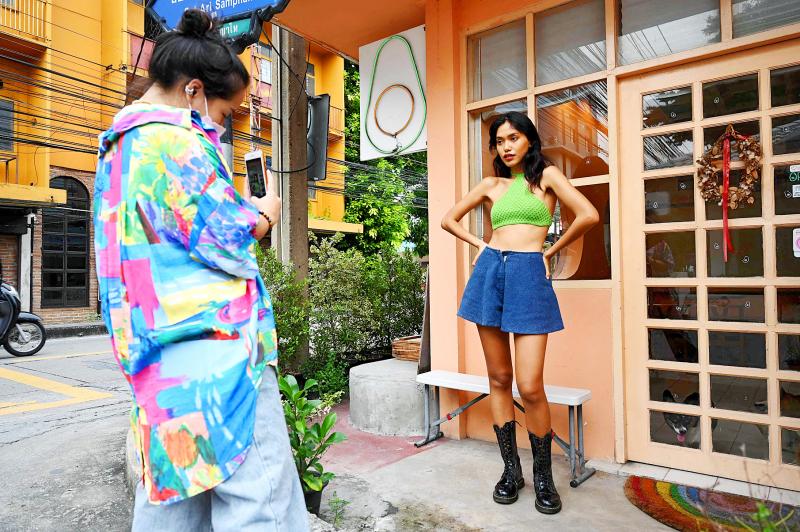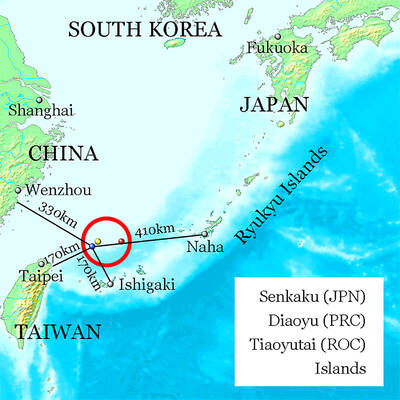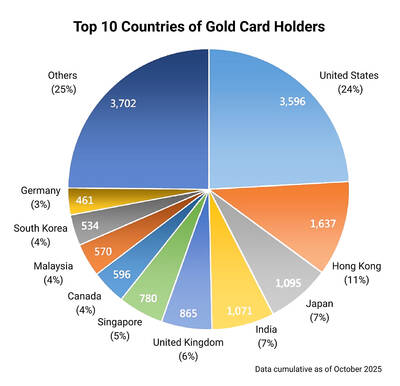Sporting neon hair and flawless skin, Bangkok Naughty Boo is one of a new generation of influencers in Asia promising to stay forever young, on-trend and scandal-free — because they are computer generated. Blurring the lines between fantasy and reality, these stars are hugely popular with teenagers in the region and will yield increasing power as interest grows in the “metaverse,” industry experts say.
“I’m 17 forever, non-binary, with a dream of becoming a pop star,” Bangkok Naughty Boo — who uses they/them pronouns — said in an introductory video.
Created by fashion designer Adisak Jirasakkasem and his friends, who envisioned a gender-fluid persona to hang the ideals of the artist community, the character is one of a tribe of “Made in Thailand” virtual influencers borne from COVID-19 pressures.

Photo: AFP
In September, Ai-Ailynn made her debut — she was created after her agency became frustrated by the “limitations on human influencers” during COVID-19 lockdowns.
Virtual influencers “are suitable for the new normal,” SIA Bangkok said.
Artificial intelligence creations are establishing a foothold worldwide in the lucrative influencer market, which is expected to be worth US$13.8 billion in 2021, according to data giant Statista.

Photo: AFP
But industry analysts say Asia is where the industry will really boom in the coming decade. “We think Asia will be an area of rapid growth in the sector of virtual influencers. Generation Z is the largest group of Internet users in Asia, and it is a digitally adept generation that is highly familiar with social media and all things virtual,” explained Nick Baklanov, a marketing specialist with Hype Auditor.
‘FIRST METAVERSE INHABITANTS’
The number of virtual influencers has more than tripled to 130 in two years, according to Baklanov, who predicted Facebook’s investment in the metaverse — dubbed a VR version of the Internet — will mean an industry boom.
“Virtual influencers are better suited to the role of the first inhabitants of the metaverse than anyone else,” he added.
The biggest virtual earner is believed to be Lil Miquela, the LA-based “robot It-Girl” who has worked with Prada and Calvin Klein, and makes an estimated US$7,000 per post.
The WHO recruited Knox Frost, a 21-year-old AI “universal adapter” from Atlanta, to spread coronavirus safety messages to his 700,000 followers.
In Asia, computer-generated pop stars including Japan’s Hatsune Miku and Luo Tianyi from China, as well as virtual K-Pop groups Eternity and K/DA, have paved the way for newer “stars” as technology improves. To create Bangkok Naughty Boo, Adisak photographed a model in different locations across the Thai capital before creating the character’s face online. He merged the computer-generated face and the real life model’s body to make his virtual idol.
Bangkok Naughty Boo has already been signed to a leading Thai — human — modeling agency, while Ai-Ailynn has already secured a deal to be the face of a major mobile operator.
“Influencers yield more power in the East and provide more lucrative brand and engagement opportunities, as the idol and fandom concepts are more rooted in culture,” Saisangeeth Daswani, a fashion and beauty industry analyst at market intelligence company Stylus, explained.
SCANDAL-FREE, CONTROLLED LIVES
With trouble-free pasts, a round-the-clock work ethic and easily controlled public personas, the fictional avatars are also respite for companies weary of reputational damage.
“Some brands enjoy the safety of associating with (virtual) influencers who have a pre-defined backstory and future,” commented Christopher Travers, the founder of Virtual Humans, a Web site tracking the industry.
And with authorities in some Asian nations policing freedom of expression, businesses may prefer the ability to control everything.
“The Chinese government’s recent crackdown on exorbitantly paid, ‘vulgar’ and ‘immoral’ influencers is likely to further boost the appeal of virtual influencers,” explained Chen May Yee, APAC director for Wunderman Thompson Intelligence. “They won’t make impolitic comments or be embroiled in sex scandals.”
SIA Bangkok say there has been huge interest in Ai-Ailynn with businesses in pandemic-ravaged Asia looking to “innovation and a new world order.” A shake-up of the status quo may have some flesh-and-blood content creators worried, but human influencer Mutchima Wachirakomain welcomes the newcomers.
“They are freaking cool,” exclaimed the 25-year-old, who shares glamor shots alongside “no filter” makeup-free looks to her 21,100 followers on Instagram.
“People still yearn for authenticity, the realness of a real-life influencer,” she said as she prepped for a shoot at an avocado-themed cafe. “The characters can’t replace the intimate connections humans have with each other.”
But Bangkok Naughty Boo is prepared to try.
Their Instagram is a mix of cheeky ensembles shot against the backdrop of Thailand’s concrete jungle capital as well as daily life snippets like getting a first vaccine shot and spilling bubble milk tea.
“I hope I can meet you all in person one day. Love you!” they said, signing off with a kiss.

Last week gave us the droll little comedy of People’s Republic of China’s (PRC) consul general in Osaka posting a threat on X in response to Japanese Prime Minister Sanae Takaichi saying to the Diet that a Chinese attack on Taiwan may be an “existential threat” to Japan. That would allow Japanese Self Defence Forces to respond militarily. The PRC representative then said that if a “filthy neck sticks itself in uninvited, we will cut it off without a moment’s hesitation. Are you prepared for that?” This was widely, and probably deliberately, construed as a threat to behead Takaichi, though it

Seven hundred job applications. One interview. Marco Mascaro arrived in Taiwan last year with a PhD in engineering physics and years of experience at a European research center. He thought his Gold Card would guarantee him a foothold in Taiwan’s job market. “It’s marketed as if Taiwan really needs you,” the 33-year-old Italian says. “The reality is that companies here don’t really need us.” The Employment Gold Card was designed to fix Taiwan’s labor shortage by offering foreign professionals a combined resident visa and open work permit valid for three years. But for many, like Mascaro, the welcome mat ends at the door. A

Nov. 17 to Nov. 23 When Kanori Ino surveyed Taipei’s Indigenous settlements in 1896, he found a culture that was fading. Although there was still a “clear line of distinction” between the Ketagalan people and the neighboring Han settlers that had been arriving over the previous 200 years, the former had largely adopted the customs and language of the latter. “Fortunately, some elders still remember their past customs and language. But if we do not hurry and record them now, future researchers will have nothing left but to weep amid the ruins of Indigenous settlements,” he wrote in the Journal of

Even after years in business, weekend tables here can be booked out a month in advance. The price point far exceeds its competitors. Granted, expectations are soaringly high, but something here failed to hit the high notes. There are a few telltale signs that a restaurant relies solely on outstanding food to create the experience, no gimmicks or distractions needed. La Mole is such a restaurant. The atmosphere is food-forward, with an open kitchen center stage. Our tables are simple; no candles, no dim lighting, no ambient music. The menu is brief, and our waiter directs most